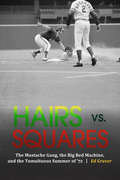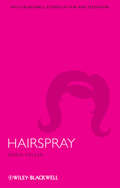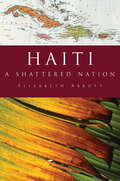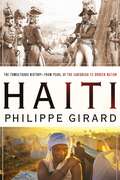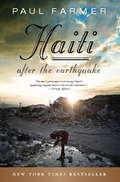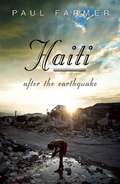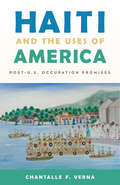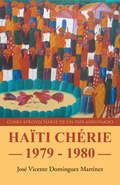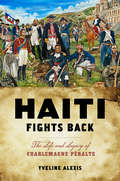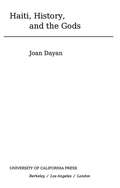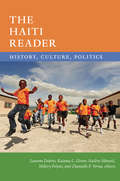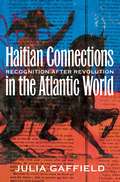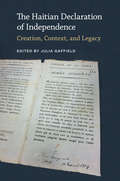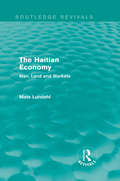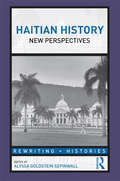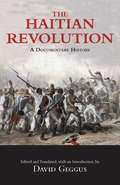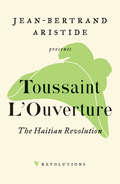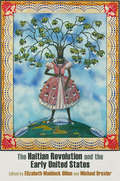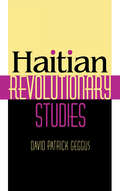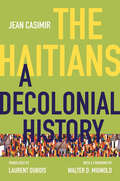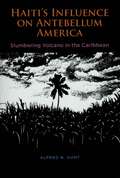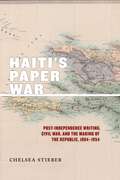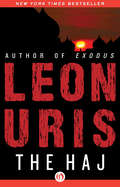- Table View
- List View
Hair: A Human History (Annals Of The New York Academy Of Sciences Ser. #Vol. 642)
by Kurt StennA microhistory in the vein of Salt and Cod exploring the biological, evolutionary, and cultural history of one of the world's most fascinating fibers. Most people don't give a second thought to the stuff on their head, but hair has played a crucial role in in fashion, the arts, sports, commerce, forensics, and industry. In Hair, Kurt Stenn — one of the world's foremost hair follicle experts — takes readers on global journey through history, from fur merchant associations and sheep farms to medical clinics and patient support groups, to show the remarkable impact hair has had on human life. From a completely bald beauty queen with alopecia to the famed hair-hang circus act, Stenn weaves the history of hair through a variety of captivating examples, with sources varying from renaissance merchants’ diaries to interviews with wig makers, modern barbers, and more. In addition to expelling the biological basis and the evolutionary history of hair, the fiber is put into context: hair in history (as tied to textile mills and merchant associations), hair as a construct for cultural and self-identity, hair in the arts (as the material for artist's brushes and musical instruments), hair as commodity (used for everything from the inner lining of tennis balls to an absorbent to clean up oil spills), and hair as evidence in criminology. Perfect for fans of Mark Kurlansky, Hair is a compelling read based solidly in historical and scientific research that will delight any reader who wants to know more about the world around them.
A Hairdresser's Experience in High Life
by Eliza PotterPotter was a freeborn black woman who, as a hairdresser, was in a unique position to hear about, receive confidences from, and observe wealthy white women—and she recorded it all in a revelatory book that delighted Cincinnati's gossip columnists at the time. But more important is Potter's portrait of herself as a wage-earning woman, proud of her work, who earned high pay and accumulated quite a bit of money as one of the nation's earliest "beauticians" at a time when most black women worked at the bottom of the socioeconomic ladder. Because her work offered insights into the private lives of elite white women, Potter carved out a literary space that featured a black working woman at the center, rather than at the margins, of the era's transformations in gender, race, and class structure.-Print ed.
Hairs vs. Squares: The Mustache Gang, the Big Red Machine, and the Tumultuous Summer of '72
by Ed GruverHairs vs. Squares is an ode to an unforgettable season that began with the first major players’ strike in the history of North American sports and ended with a record-setting World Series played by two of the game’s greatest and most colorful dynasties. In a sign of the times it was Hippies vs. Hardhats, a clash of cultures with the hirsute, mod Mustache Gang colliding with the clean-cut, conservative Big Red Machine on the game’s grandest stage. <p><p> When the Oakland A’s met the Cincinnati Reds in the 1972 Fall Classic, more than a championship was at stake. The more than two dozen interviews bring to life a time when controversy was commonplace, both inside and outside the national pastime. In baseball, Willie Mays was traded, Hank Aaron was chasing down Babe Ruth’s home run record, and Dick Allen was helping to save the Chicago White Sox franchise while winning the American League’s Most Valuable Player award. Outside the American pastime the war in Vietnam was raging, campus protests spread throughout the country, and Watergate and the Munich Olympics headlined the tumultuous year. <p> The 1972 Major League Baseball season was marked by the rapid rise of rookies and young stars, the fall of established teams and veterans, courageous comebacks, and personal redemptions. Along with the many unforgettable and outrageous characters inside baseball, Hairs vs. Squares emphasizes the dramatic changes that took place on and off the field in the 1970s. Owners’ lockouts, on-field fights, maverick managers, controversial trades, artificial fields, the first full five-game League Championship Series, and the closest, most competitive World Series ever, combined to make the 1972 season as complex as the social and political unrest that marked the era.
Hairspray (Wiley-blackwell Series In Film And Television Ser. #12)
by Dana HellerBy reconsidering assumptions about mainstream popular culture and its revolutionary possibilities, author Dana Heller reveals that John Waters' popular 1988 film Hairspray is the director's most subversive movie. Represents the first scholarly work on any of film director John Waters' films Incorporates original interview material with the director Reveals meanings embedded in the film's narrative treatment of racial and sexual politics
Haiti: A Shattered Nation
by Elizabeth AbbottHaiti: A Shattered Nation is the definitive inside account of a country perpetually in headlines and in conflict. Renowned author Elizabeth Abbott, who lived and wrote in Haiti, begins with the notorious Duvaliers—father and son—and explores their legacy to the present day. In 1803, the enslaved people of Haiti vanquished their French masters after a bloody war which left tens of thousands dead. Since then, the Haitian people have endured more than one corrupt regime that drove millions into exile, cowed those who remained, and tortured hundreds of thousands. In this revised and updated edition, Abbott ably shows how the early dictators’ legacy shaped modern Haiti as she traces the repercussions of their actions to the present day, and the disastrous earthquake that shook the world.
Haiti: The Tumultuous History
by Philippe GirardWhy has Haiti been plagued by so many woes? Why have multiple U.S. efforts to create a stable democracy in Haiti failed so spectacularly? Philippe Girard answers these and other questions, examining how colonialism and slavery have left a legacy of racial tension, both within Haiti and internationally; Haitians remain deeply suspicious of white foriegners' motives, many of whom doubt Hatians' ability to govern themselves. He also examines how Haiti's current political instability is merely a continuation of political strife that began during the War of Independence (1791-1804). Finally, in Haiti: The Tumultuous History, Girard explores poverty's devastating impact on contemporary Haiti and argues that Haitians--particularly home-grown dictators--bear a big share of the responsibility for their nation's troubles.
Haiti After the Earthquake
by Paul FarmerOn January 12, 2010 a major earthquake struck near Port-au-Prince, Haiti. Hundreds of thousands of people died, and the greater part of the capital was demolished. Dr. Paul Farmer, U. N. deputy special envoy to Haiti, had worked in the country for nearly thirty years, treating infectious diseases like tuberculosis and AIDS. No one understood better than he how painful it was that Haiti, the site of so much suffering, would have to endure another disaster. It was, in his words, a “cruel cosmic joke. ” Farmer and former President Bill Clinton, the U. N. special envoy to Haiti, had just begun to work on an extensive development plan to improve living conditions in Haiti. Now their project was transformed into a massive international rescue and relief effort. In his own words, Farmer documents this effort, including the harrowing obstacles and the small triumphs. Support came in the form of dozens of humanitarian groups and a flood of money. Despite this outpouring of aid, the challenges were astronomical. U. N. plans were crippled by Haiti’s fragile infrastructure and the death of U. N. staff members who had been based in Port-au-Prince. As the humanitarian operations grew, questions about their effectiveness mounted. By some estimates, Haiti had more NGOs per capita than any other place on earth. And yet, Haitians were still suffering from a lack of basic services, from a lack of food, water, and shelter. Farmer shows how the earthquake heightened the problems in Haiti and argues that these long-term challenges cannot be ignored. In chronicling the relief effort, Farmer draws attention to the social issues that made Haiti so vulnerable to this natural disaster. Now that their already weak public-health system has been further damaged, Haiti’s poor are even more vulnerable to fresh onslaughts of diseases like cholera and typhoid. Yet Farmer’s account is not a gloomy catalog of impenetrable problems. As devastating as Haiti’s circumstances are, its population manages to keep going. Farmer shows how, even in the barest camps, Haitians organize themselves, creating small businesses such as beauty parlors. His narrative is interwoven with stories from Haitians themselves, from doctors and others working on the ground. Ultimately this is a story of human endurance and humility in difficult circumstances. Once again, Paul Farmer reveals what can be accomplished in the face of seemingly overwhelming odds.
Haiti After the Earthquake
by Paul FarmerOn January 12, 2010 a massive earthquake laid waste to Port-au-Prince, Haiti, killing hundreds of thousands of people. Within three days, Dr. Paul Farmer arrived in the Haitian capital, along with a team of volunteers, to lend his services to the injured.In this vivid narrative, Farmer describes the incredible suffering--and resilience--that he encountered in Haiti. Having worked in the country for nearly thirty years, he skillfully explores the social issues that made Haiti so vulnerable to the earthquake--the very issues that make it an "unnatural disaster." Complementing his account are stories from other doctors, volunteers, and earthquake survivors.Haiti After the Earthquake will both inform and inspire readers to stand with the Haitian people against the profound economic and social injustices that formed the fault line for this disaster.
Haiti and the Uses of America: Post-U.S. Occupation Promises
by Chantalle F. VernaContrary to popular notions, Haiti-U.S. relations have not only been about Haitian resistance to U.S. domination. In Haiti and the Uses of America, Chantalle F. Verna makes evident that there have been key moments of cooperation that contributed to nation-building in both countries. In the years following the U.S. occupation of Haiti (1915-1934), Haitian politicians and professionals with a cosmopolitan outlook shaped a new era in Haiti-U.S. diplomacy. Their efforts, Verna shows, helped favorable ideas about the United States, once held by a small segment of Haitian society, circulate more widely. In this way, Haitians contributed to and capitalized upon the spread of internationalism in the Americas and the larger world.
HAÏTI CHÉRIE 1979 - 1980: Cómo aprovecharse de un país arruinado
by José Vicente Domínguez MartínezEste libro explora y denuncia las difíciles condiciones de vida de los haitianos, presenciada por el autor durante su estancia en ese país y nos revela, al mismo tiempo, el sorprendente espíritu de un pueblo cuyo espíritu es más grande que la opresión. <P><P>Haití, 1979. Después de catorce años como oficial y capitán en buques mercantes, y a la sazón capitán de un buque factoría, J.V. Domínguez decide cambiar su vida y consigue ser nombrado director gerente de una empresa pesquera con base administrativa en el hermoso, pequeño y pobre Haití.
Haiti Fights Back: The Life and Legacy of Charlemagne Péralte (Critical Caribbean Studies)
by Yveline AlexisHaiti Fights Back: The Life and Legacy of Charlemagne Péralte is the first US scholarly examination of the politician and caco leader (guerrilla fighter) who fought against the US military occupation of Haiti. The occupation lasted close to two decades, from 1915-1934. Alexis argues for the importance of documenting resistance while exploring the occupation’s mechanics and its imperialism. She takes us to Haiti, exploring the sites of what she labels as resistance zones, including Péralte’s hometown of Hinche and the nation’s large port areas--Port-au-Prince and Cap-Haïtien. Alexis offers a new reading of U.S. military archival sources that record Haitian protests as banditry. Haiti Fights Back illuminates how Péralte launched a political movement, and meticulously captures how Haitian women and men resisted occupation through silence, military battles, and writings. She locates and assembles rare, multilingual primary sources from traditional repositories, living archives (oral stories), and artistic representations in Haiti and the United States. The interdisciplinary work draws on legislation, cacos’ letters, newspapers, and murals, offering a unique examination of Péralte’s life (1885-1919) and the significance of his legacy through the twenty-first century. Haiti Fights Back offers a new approach to the study of the U.S. invasion of the Americas by chronicling how Caribbean people fought back.
Haiti, History, and the Gods
by Joan DayanIn Haiti, History, and the Gods, Joan Dayan charts the cultural imagination of Haiti not only by reconstructing the island's history but by highlighting ambiguities and complexities that have been ignored. She investigates the confrontational space in which Haiti is created and recreated in fiction and fact, text and ritual, discourse and practice. Dayan's ambitious project is a research tour de force that gives human dimensions to this eighteenth-century French colony and provides a template for understanding the Haiti of today. In examining the complex social fabric of French Saint-Domingue, which in 1804 became Haiti, Dayan uncovers a silenced, submerged past. Instead of relying on familiar sources to reconstruct Haitian history, she uses a startling diversity of voices that have previously been unheard. Many of the materials recovered here--overlooked or repressed historical texts, legal documents, religious works, secret memoirs, letters, and literary fictions--have never been translated into English. Others, such as Marie Vieux Chauvet's radical novel of vodou, Fonds des Nègres, are seldom used as historical sources. Dayan also argues provocatively for the consideration of both vodou rituals and narrative fiction as repositories of history. Her scholarship is enriched by the insights she has gleaned from conversations and experiences during her many trips to Haiti over the past twenty years. Taken together, the material presented in Haiti, History, and the Gods not only restores a lost chapter of Haitian history but suggests necessary revisions to the accepted histories of the New World.
The Haiti Reader: History, Culture, Politics (The Latin America Readers)
by Laurent Dubois et al.While Haiti established the second independent nation in the Western Hemisphere and was the first black country to gain independence from European colonizers, its history is not well known in the Anglophone world. The Haiti Reader introduces readers to Haiti's dynamic history and culture from the viewpoint of Haitians from all walks of life. Its dozens of selections—most of which appear here in English for the first time—are representative of Haiti's scholarly, literary, religious, visual, musical, and political cultures, and range from poems, novels, and political tracts to essays, legislation, songs, and folk tales. Spanning the centuries between pre-contact indigenous Haiti to the aftermath of the 2010 earthquake, the Reader covers widely known episodes in Haiti's history, such as the U.S. military occupation and the Duvalier dictatorship, as well as overlooked periods such as the decades immediately following Haiti's &“second independence&” in 1934. Whether examining issues of political upheaval, the environment, or modernization, The Haiti Reader provides an unparalleled look at Haiti's history, culture, and politics.
Haitian Connections in the Atlantic World
by Julia GaffieldOn January 1, 1804, Haiti shocked the world by declaring independence. Historians have long portrayed Haiti's postrevolutionary period as one during which the international community rejected Haiti's Declaration of Independence and adopted a policy of isolation designed to contain the impact of the world's only successful slave revolution. Julia Gaffield, however, anchors a fresh vision of Haiti's first tentative years of independence to its relationships with other nations and empires and reveals the surprising limits of the country's supposed isolation.Gaffield frames Haitian independence as both a practical and an intellectual challenge to powerful ideologies of racial hierarchy and slavery, national sovereignty, and trade practice. Yet that very independence offered a new arena in which imperial powers competed for advantages with respect to military strategy, economic expansion, and international law. In dealing with such concerns, foreign governments, merchants, abolitionists, and others provided openings that were seized by early Haitian leaders who were eager to negotiate new economic and political relationships. Although full political acceptance was slow to come, economic recognition was extended by degrees to Haiti--and this had diplomatic implications. Gaffield's account of Haitian history highlights how this layered recognition sustained Haitian independence.
The Haitian Declaration of Independence: Creation, Context, and Legacy (Jeffersonian America)
by Julia GaffieldWhile the Age of Revolution has long been associated with the French and American Revolutions, increasing attention is being paid to the Haitian Revolution as the third great event in the making of the modern world. A product of the only successful slave revolution in history, Haiti's Declaration of Independence in 1804 stands at a major turning point in the trajectory of social, economic, and political relations in the modern world. This declaration created the second independent country in the Americas and certified a new genre of political writing. Despite Haiti's global significance, however, scholars are only now beginning to understand the context, content, and implications of the Haitian Declaration of Independence. This collection represents the first in-depth, interdisciplinary, and integrated analysis by American, British, and Haitian scholars of the creation and dissemination of the document, its content and reception, and its legacy. Throughout, the contributors use newly discovered archival materials and innovative research methods to reframe the importance of Haiti within the Age of Revolution and to reinterpret the declaration as a founding document of the nineteenth-century Atlantic World. The authors offer new research about the key figures involved in the writing and styling of the document, its publication and dissemination, the significance of the declaration in the creation of a new nation-state, and its implications for neighboring islands. The contributors also use diverse sources to understand the lasting impact of the declaration on the country more broadly, its annual celebration and importance in the formation of a national identity, and its memory and celebration in Haitian Vodou song and ceremony. Taken together, these essays offer a clearer and more thorough understanding of the intricacies and complexities of the world's second declaration of independence to create a lasting nation-state.
The Haitian Economy: Man, Land and Markets (Routledge Revivals)
by Mats LundahlHaiti is a very poor country with a stagnant economy. This title, first published in 1983, considers the Haitian economy, placing it in its historical context, and explores the reasons why it has performed so badly. Mats Lundahl examines agriculture, which has failed to provide an adequate standard of living, analyses the structure of agricultural production, and explains why the land is so unproductive. Lundahl analyses why technology in agriculture is so underdeveloped and argues that no government since 1820 has been seriously interested in fostering economic development, since vested interest consistently intervenes to discourage new projects.
Haitian History: New Perspectives (Rewriting Histories)
by Alyssa Goldstein SepinwallDespite Haiti's proximity to the United States, and its considerable importance to our own history, Haiti barely registered in the historic consciousness of most Americans until recently. Those who struggled to understand Haiti's suffering in the earthquake of 2010 often spoke of it as the poorest country in the Western hemisphere, but could not explain how it came to be so. In recent years, the amount of scholarship about the island has increased dramatically. Whereas once this scholarship was focused on Haiti’s political or military leaders, now the historiography of Haiti features lively debates and different schools of thought. Even as this body of knowledge has developed, it has been hard for students to grasp its various strands. Haitian History presents the best of the recent articles on Haitian history, by both Haitian and foreign scholars, moving from colonial Saint Domingue to the aftermath of the 2010 earthquake. It will be the go-to one-volume introduction to the field of Haitian history, helping to explain how the promise of the Haitian Revolution dissipated, and presenting the major debates and questions in the field today.
The Haitian Revolution: A Documentary History
by David Geggus"A landmark collection of documents by the field's leading scholar. This reader includes beautifully written introductions and a fascinating array of never-before-published primary documents. These treasures from the archives offer a new picture of colonial Saint-Domingue and the Haitian Revolution. The translations are lively and colorful." --Alyssa Sepinwall, California State University San Marcos
The Haitian Revolution
by Toussaint L'OuvertureToussaint L’Ouverture was the leader of the Haitian Revolution in the late eighteenth century, in which slaves rebelled against their masters and established the first black republic. In this collection of his writings and speeches, former Haitian politician Jean-Bertrand Aristide demonstrates L’Ouverture's profound contribution to the struggle for equality.
The Haitian Revolution and the Early United States: Histories, Textualities, Geographies (Early American Studies)
by Elizabeth Maddock Dillon Michael DrexlerWhen Jean-Jacques Dessalines proclaimed Haitian independence on January 1, 1804, Haiti became the second independent republic, after the United States, in the Americas; the Haitian Revolution was the first successful antislavery and anticolonial revolution in the western hemisphere. The histories of Haiti and the early United States were intimately linked in terms of politics, economics, and geography, but unlike Haiti, the United States would remain a slaveholding republic until 1865. While the Haitian Revolution was a beacon for African Americans and abolitionists in the United States, it was a terrifying specter for proslavery forces there, and its effects were profound. In the wake of Haiti's liberation, the United States saw reconfigurations of its geography, literature, politics, and racial and economic structures.The Haitian Revolution and the Early United States explores the relationship between the dramatic events of the Haitian Revolution and the development of the early United States. The first section, "Histories," addresses understandings of the Haitian Revolution in the developing public sphere of the early United States, from theories of state sovereignty to events in the street; from the economic interests of U.S. merchants to disputes in the chambers of diplomats; and from the flow of rumor and second-hand news of refugees to the informal communication networks of the enslaved. The second section, "Geographies," explores the seismic shifts in the ways the physical territories of the two nations and the connections between them were imagined, described, inhabited, and policed as a result of the revolution. The final section, "Textualities," explores the wide-ranging consequences that reading and writing about slavery, rebellion, emancipation, and Haiti in particular had on literary culture in both the United States and Haiti.With essays from leading and emerging scholars of Haitian and U.S. history, literature, and cultural studies, The Haitian Revolution and the Early United States traces the rich terrain of Haitian-U.S. culture and history in the long nineteenth century.Contributors: Anthony Bogues, Marlene Daut, Elizabeth Maddock Dillon, Michael Drexler, Laurent Dubois, James Alexander Dun, Duncan Faherty, Carolyn Fick, David Geggus, Kieran Murphy, Colleen O'Brien, Peter P. Reed, Siân Silyn Roberts, Cristobal Silva, Ed White, Ivy Wilson, Gretchen Woertendyke, Edlie Wong.
Haitian Revolutionary Studies (Blacks in the Diaspora)
by David Patrick GeggusThe Haitian Revolution of 1789–1803 transformed the Caribbean's wealthiest colony into the first independent state in Latin America, encompassed the largest slave uprising in the Americas, and inflicted a humiliating defeat on three colonial powers. In Haitian Revolutionary Studies, David Patrick Geggus sheds new light on this tremendous upheaval by marshaling an unprecedented range of evidence drawn from archival research in six countries. Geggus's fine-grained essays explore central issues and little-studied aspects of the conflict, including new historiography and sources, the origins of the black rebellion, and relations between slaves and free people of color. The contributions of vodou and marronage to the slave uprising, Toussaint Louverture and the abolition question, the policies of the major powers toward the revolution, and its interaction with the early French Revolution are also addressed. Questions about ethnicity, identity, and historical knowledge inform this essential study of a complex revolution.
The Haitians: A Decolonial History (Latin America in Translation/en Traducción/em Tradução)
by Jean CasimirIn this sweeping history, leading Haitian intellectual Jean Casimir argues that the story of Haiti should not begin with the usual image of Saint-Domingue as the richest colony of the eighteenth century. Rather, it begins with a reconstruction of how individuals from Africa, in the midst of the golden age of imperialism, created a sovereign society based on political imagination and a radical rejection of the colonial order, persisting even through the U.S. occupation in 1915.The Haitians also critically retheorizes the very nature of slavery, colonialism, and sovereignty. Here, Casimir centers the perspectives of Haiti's moun andeyo—the largely African-descended rural peasantry. Asking how these systematically marginalized and silenced people survived in the face of almost complete political disenfranchisement, Casimir identifies what he calls a counter-plantation system. Derived from Caribbean political and cultural practices, the counter-plantation encompassed consistent reliance on small-scale landholding. Casimir shows how lakou, small plots of land often inhabited by generations of the same family, were and continue to be sites of resistance even in the face of structural disadvantages originating in colonial times, some of which continue to be maintained by the Haitian government with support from outside powers.
Haiti's Influence on Antebellum America: Slumbering Volcano in the Caribbean
by Alfred N. HuntThe Haitian Revolution began in 1791 as a slave revolt on the French colonial island of Saint Domingue and ended thirteen years later with the founding of an independent black republic. Waves of French West Indians -- slaves, white colonists, and free blacks -- fled the upheaval and flooded southern U.S. ports -- most notably New Orleans -- bringing with them everything from French opera to voodoo. Alfred N. Hunt discusses the ways these immigrants affected southern agriculture, architecture, language, politics, medicine, religion, and the arts. He also considers how the events in Haiti influenced the American slavery-emancipation debate and spurred developments in black militancy and Pan-Africanism in the United States. By effecting the development of racial ideology in antebellum America, Hunt concludes, the Haitian Revolution was a major contributing factor to the attitudes that led to the Civil War.
Haiti's Paper War: Post-Independence Writing, Civil War, and the Making of the Republic, 1804–1954 (America and the Long 19th Century #25)
by Chelsea StieberTurns to the written record to re-examine the building blocks of a nationPicking up where most historians conclude, Chelsea Stieber explores the critical internal challenge to Haiti’s post-independence sovereignty: a civil war between monarchy and republic. What transpired was a war of swords and of pens, waged in newspapers and periodicals, in literature, broadsheets, and fliers. In her analysis of Haitian writing that followed independence, Stieber composes a new literary history of Haiti, that challenges our interpretations of both freedom struggles and the postcolonial. By examining internal dissent during the revolution, Stieber reveals that the very concept of freedom was itself hotly contested in the public sphere, and it was this inherent tension that became the central battleground for the guerre de plume—the paper war—that vied to shape public sentiment and the very idea of Haiti.Stieber’s reading of post-independence Haitian writing reveals key insights into the nature of literature, its relation to freedom and politics, and how fraught and politically loaded the concepts of “literature” and “civilization” really are. The competing ideas of liberté, writing, and civilization at work within postcolonial Haiti have consequences for the way we think about Haiti’s role—as an idea and a discursive interlocutor—in the elaboration of black radicalism and black Atlantic, anticolonial, and decolonial thought. In so doing, Stieber reorders our previously homogeneous view of Haiti, teasing out warring conceptions of the new nation that continued to play out deep into the twentieth century.
The Haj
by Leon UrisA proud Arab family in Palestine struggles to hold on to its identity during the birth of the State of Israel In the early 1920s, young Ibrahim al Soukori has achieved his dreams of heading his small Palestinian town, becoming a proud father, and making the pilgrimage to Mecca. But his family's journey has just begun, and soon global war and Israel's formation force them on a path to possible dissolution. Ibrahim's sons and daughters squabble and find peace with the nearby kibbutz, suffer betrayals, and hold together even when displaced to distant refugee camps. Written by an author best known for his sympathetic portrayal of Israel's difficult birth, The Haj speaks to the history of a troubled region from the perspective of a remarkable Arab dynasty. This ebook features an illustrated biography of Leon Uris including rare photos from the author's estate.


